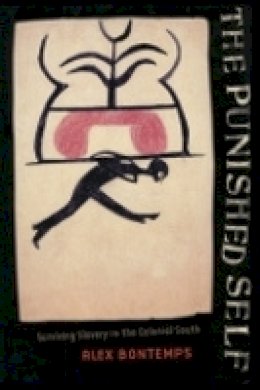
The Punished Self: Surviving Slavery in the Colonial South
Alex Bontemps
The Punished Self describes enslavement in the American South during the eighteenth century as a systematic assault on Blacks' sense of self. Alex Bontemps focuses on slavery's effects on the slaves' framework of self-awareness and understanding. Whites wanted Blacks to act out the role "Negro" and Blacks faced a basic dilemma of identity: how to retain an individualized sense of self under the incredible pressure to be Negro? Bontemps addresses this dynamic in The Punished Self.
The first part of The Punished Self reveals how patterns of objectification were reinforced by written and visual representations of enslavement. The second examines how captive Africans were forced to accept a new identity and the expectations and behavioral requirements it symbolized. Part 3 defines and illustrates the tensions inherent in slaves' being Negro in order to survive.
Bontemps offers fresh interpretations of runaway slave ads and portraits. Such views of black people expressing themselves are missing entirely from other historical sources. This book's revelations include many such original examples of the survival of the individual in the face of enslavement.
Product Details
About Alex Bontemps
Reviews for The Punished Self: Surviving Slavery in the Colonial South
Michael A. Gomez
American Historical Review
Bontemps has created an imaginative and challenging work that provides a well-crafted template outlining the dynamic and psychic consequences of the process of enslavement.... It appears very likely that the central problem articulated here will be the site of rich future investigations.
Sean Condon
H-Net Reviews
Bontemps's analysis is at once insightful and, in the fullest sense of the word, challenging. Believing that absence of evidence is not evidence of absence, he painstakingly pieces together the sources of white elites to reveal both what was said in the records and, more importantly, 'what they left unsaid or only superficially acknowledged.' His close analysis and densely argued narrative challenges the dualities of accommodation and resistance, slavery and freedom. Asking new questions of standard sources, Bontemps reveals with insight and imagination the psychological consequences of objectification, and blacks' struggle to maintain a sense of self while adapting to the brutalities and dehumanization of enslavement.
Michael A. Morrison
Georgia Historical Quarterly
Central to the discussion here is the recognition of the capacity of slaves to endure and survive... potential and real exploitation and harm. Equally remarkable was their awareness of both their own vulnerability and ultimate durability. Bontemps stresses that the burden of having survived was embedded in the triumph of survival. Much of this provides a fresh and insightful perspective on what has already been gleaned and defined by other historians. What is completely original is the early part of the book's concentration on viewing the slave experience through the gaze of painters and sketch artists.
Mary Ellison
Race and Class
The author of The Punished Self has set for himself a daunting task: to try to extract from the available sources how, in a system of brutal repression and control, the enslaved retained a sense of self.... This book is a provocative addition to the literature on colonial slavery and the psychological toll the institution levied on the enslaved.
Caroline Cox
North Carolina Historical Review
This theoretical study explores how Africans survived the dehumanizing institution of slavery in the British mainland colonies.... The questions raised by Bontemps are fundamental ones for scholars to consider.
Choice
